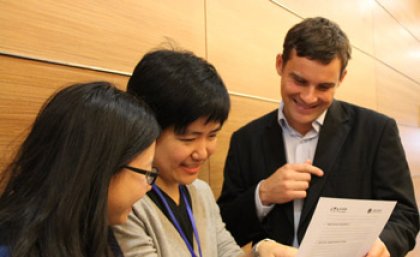
As Shanghai commenced its emissions trading scheme this week, senior industry and government representatives were given a crash course in emissions trading by The University of Queensland.
UQ PhD student Adrian Ward used the CarbonGame iPad app to run the workshop for the Shanghai Energy and Environment Exchange, the Chinese Government agency in charge of implementing the scheme.
The CarbonGame is an interactive iPad simulation program developed by Mr Ward, Dr Paul Dargusch and Sebastian Thomas from UQ’s School of Geography, Planning and Environmental Management, in collaboration with UQ’s Global Change Institute.
The workshop, which used the interactive CarbonGame iPad simulation program, was delivered on Monday 25 November, a day before the trading scheme commenced.
China is trialing a number of emissions trading models with the aim of reducing carbon emissions and smog which cause significant health issues for the population as well as contribute to global climate change.
Mr Ward said there is an urgent need for outside experience in training key government and industry representatives to participate in China's emissions trading schemes.
“More than 30 participants in senior industry and government roles took part in this CarbonGame emissions trading workshop, gaining a hands-on understanding of the key principles of cap-and-trade schemes,” he said.
The app teaches advanced practical skills in carbon management through group gaming and has already been played by more than 4000 participants from 15 countries.
Understanding emissions trading is increasingly important as more than 90 countries now have a price on carbon.
“The CarbonGame allows policy makers and companies to trial a range of trading scheme designs and management strategies, providing immediate feedback on the benefits and drawbacks of each,” Mr Ward said.
“China is set to launch seven pilot trading schemes in different regions to determine the best system for roll-out across the country.
“It could soon become one of the world’s biggest carbon markets and play a leading role in ambitious action on climate change.
“UQ is the first institution to train key people in Shanghai on the functioning of emissions trading schemes and our innovative approach was appreciated.
“The Head of the Shanghai Energy and Environment Exchange commented that is was engaging, interesting and very useful, and he hopes all of his staff are able to participate in future sessions,” he said.
Organisations from government and non-government sectors who are interested in learning more can contact Mr Ward directly to arrange a demonstration of the CarbonGame.
Mr Ward is currently developing a case study in China to understand how carbon markets and carbon finance can be leveraged to improve ecosystem health and sustainability outcomes for poor communities within the Tibetan Plateau and other high-mountain communities.
More information about the CarbonGame can be found at http://www.gci.uq.edu.au/projects/carbongame
Contact: Mr Adrian Ward, PH: 0423 675 525, E: a.ward@uq.edu.au
.jpg)


